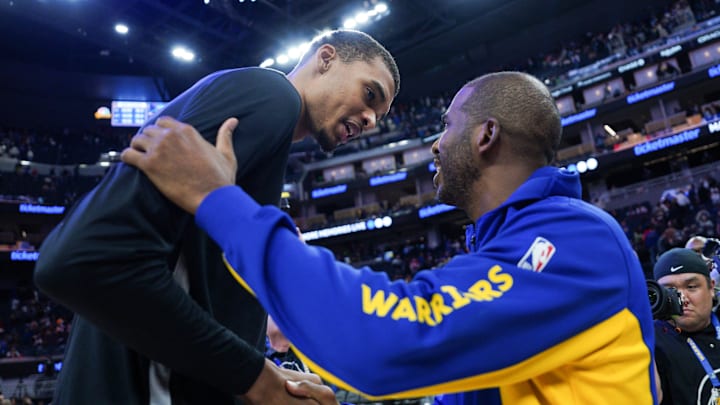The headline for the San Antonio Spurs after the start of Free Agency is unequivocally positive: they signed future Hall of Fame point guard Chris Paul, perhaps the very best player in the league suited to help mentor this young Spurs team and set up Victor Wembanyama for success.
Last season, the Spurs put the ball in Jeremy Sochan's hands, and he was unable to rise to the occasion, causing some of the worst offensive basketball in the league to come out of San Antonio and depressing Wembanyama's ability to break out. When the ball went back into the hands of a pure point guard in Tre Jones, Wemby blossomed, and the Spurs had a much better close to the season.
Now Jones can settle into his more natural backup position with Chris Paul coming to town. The 19-year veteran has made 12 All-Star teams and is one of the greatest passers of his generation. He sets up the offense in his methodical way and is elite at diming roll men in the perfect spot, be it a bounce pass on the roll or a lob at the rim.
The Spurs still have a very young team, so even with a young phenom and the "Point God," they have work to do to be competitive in a difficult Western Conference. That's not the goal this year; it's much more to develop the young core of the Spurs, players like Sochan and Malaki Branham and Blake Wesley and Stephon Castle. Paul can come in and be a veteran mentor on the court and in the locker room, and his wisdom and intentionality will do wonders for the roster now and down the road.
While Paul understands the job he is signing up for, he may also want to take another swing at winning an NBA title before his career is over. While he played a smaller role on the Golden State Warriors last season, Paul clearly has something left in the tank, and he led the league in assists as recently as 2021–22. He could genuinely help a contender, and that's likely why multiple teams looking to compete checked in with him before he signed with the Spurs.
Unless San Antonio has massive plans with their cap space, they could have signed Paul to a larger contract than the $11 million he signed with. If they keep Devonte Graham or execute another move and are over the cap, even the full Non-Taxpayer Mid-Level Exception is $12.9 million. Why did Paul leave money on the table?
Chris Paul left money on the table
Keith Smith, an NBA salary cap expert who works for the wonderful Spotrac website, noted the amount and keyed fans into a couple of reasons why Paul and the Spurs may have agreed to that amount:
Quick Chris Paul thoughts...
— Keith Smith (@KeithSmithNBA) July 1, 2024
$11M is an interesting number. Very tradable, should the Spurs hit the deadline and want to get him to a contender. A team with their MLE could even bring him in by using the MLE as a TPE.
Also: $11M is less than the NTMLE amount. That means if Paul…
The NBA's Collective Bargaining Agreement, or CBA, now allows teams to use exceptions to receive players in trades. That means a team with their MLE available during the season could acquire Paul via trade even if they don't have the space or matching salary to otherwise do so.
The second part is even more interesting. Many of the topline contenders in the league are into the luxury tax and likely won't have the MLE available to receive Paul back in a trade. They also cannot sign players during the season who were waived off of large contracts, which was often the pathway to adding "buyout" players late in the year.
Paul is making little enough in salary that he could be waived by the Spurs late in the season and sign with a contender for the playoffs—anyone from the Los Angeles Lakers to the Phoenix Suns to the Denver Nuggets. That opens up a world of options for Paul to help a team win in the playoffs while still getting paid a strong amount this year.
It may be that Paul is fully committed to the Spurs and intends to stay for the rest of his career, throwing lobs to Victor Wembanyama and setting up his post-playing career by learning from Gregg Popovich. The salary amount may be coincidental or, at worst, a backup plan he doesn't intend to use.
It's also possible that the plan from the start is to play most of the season with the Spurs and then move on. His contract amount is set up for that, and Paul is always looking multiple steps ahead when it comes to contracts and his career.
The fit is ideal, and playing with Wembanyama is appealing; time will tell what ultimately happens. If he does leave for a contender this season, via trade or a buyout, the line will be traced back to the start of free agency and Paul taking a hair less money than he needed to.
